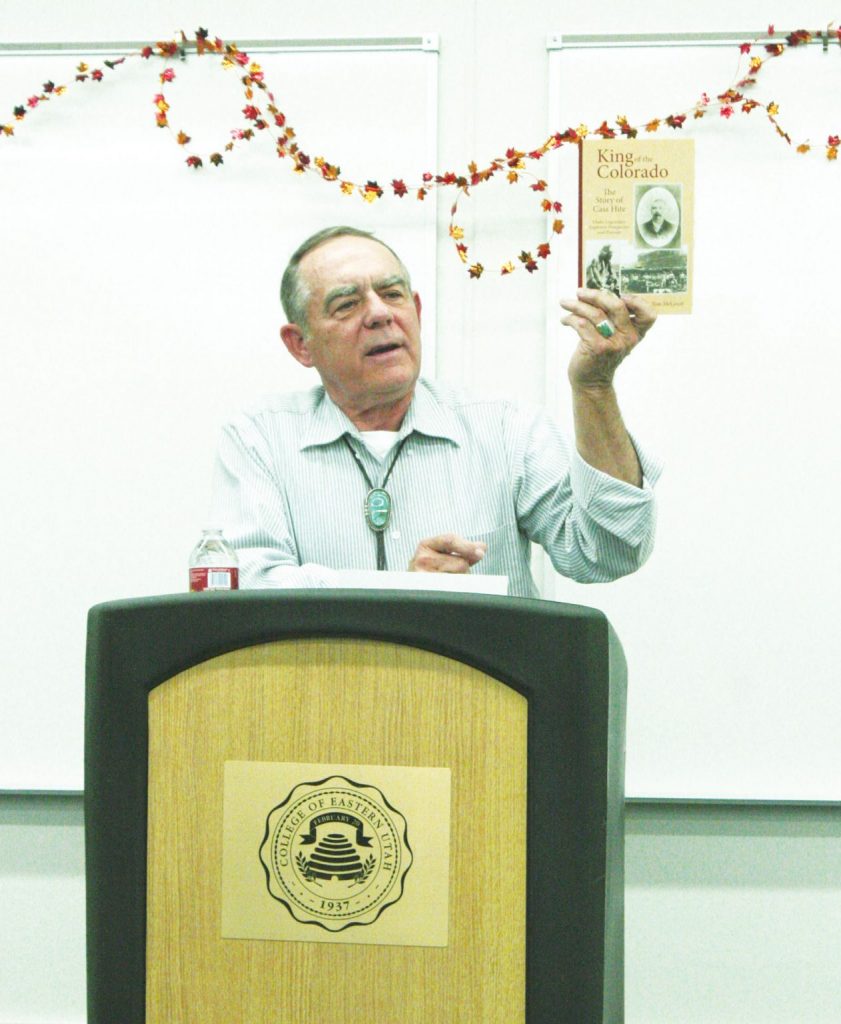Author’s Night: Tom McCourt explains how his life reflects in his stories

This archived article was written by: Priscilla A. Sharp
USU Eastern’s second annual local author’s night featured a man who has written about a war, a town at the bottom of Lake Powell and Nine Mile Canyon.
Tom McCourt spoke of these things on campus Nov. 6. He didn’t always want to be an author. His first career plan was to be an archaeologist, and he studied under Jesse Jennings who was a well-known archaeologist at the University of Utah. He was known for carrying out his excavations with order and cleanliness, and his excavation of Danger Cave near Salt Lake City.
McCourt started out his life as a normal, young Mormon boy, completely innocent and void of all perverse thought, and one summer when he was 16, he set out to work on a farm. In those 90 days he became a man, learnt many ways of the world and grew up thanks to many hateful bachelors. He describes his journey towards manhood in his book, “Split Sky.”
When he turned 19, he was called to the military in the Vietnam War. Amidst being blown up and chased like a rabid dog, he attributes the reason he’s still alive to God, if not for his help, he’s positive he would have died. In one of his books titled, “To Be a Soldier,” McCourt explains his time on the battlefield. Through his work, he says it has not only counseled him through the rough aftereffects of war, but also many other Vietnam veterans who called and voraciously thanked him for having the words to explain their feelings when they could not find any.
His love for story telling most likely came from his grandfather who he lived with when he was younger. It wasn’t until all his children had moved out, leaving him and his wife, that he decided he would attempt to put his ideas and stories onto the page. Back in those days, he says you didn’t have this fancy word processor that we have now. He used carbon paper and an old typewriter. It began when his wife came to him and told him that they no longer needed him to work. She could provide well enough for them to live, so it was time he chased his dream.
He has eight published works to his name, each telling their own story, some of life’s great hardships and one that tells the story of the last of the bandits. It was sent to him by one of his readers who had looked through an old journal belonging to his grandfather. At the time he did not realize his grandfather would be considered a bandit, but in “Last of the Robbers Roost Outlaws: Moab’s Bill Tibbets” he describes their escapades, long nights on the mountains and chasing trains.
Looking back on his life, he says the only thing he regrets is not paying more attention to his English classes, and he gives the advice to learn your trade. Reading books is an excellent way to learn how to formulate your work, and sometimes you don’t even know how you truly feel about something until you take the time to sit down and put your words onto the page.
For his book titled, “White Canyon” which describes what life might be like in the old town living under Lake Powell, he gave the first two chapters to his wife to have her proofread. She came back to him with the advice to try again because she, “Couldn’t smell the campfire yet.”




